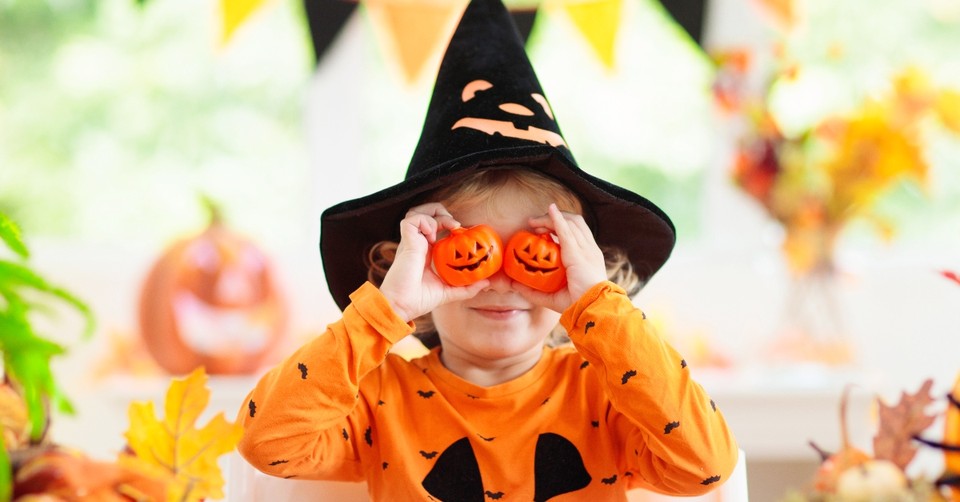3 Reasons Halloween Is Not Satan's Birthday and Never Will Be

If my memory serves me right, it was the day after Halloween sometime in the mid 90s. I had one toddler sitting in the back of a shopping cart, a baby sitting in the front basket, and about twelve bags of chocolate piled on top of both kids. The discount store near our apartment was selling leftover bags of Halloween candy for 25 cents a piece—entire bags of chocolate for a quarter!
Feeling giddy about my deal of the century, I pushed the cart into one of the check-out lanes, directly behind another mom with kids in her cart. One of her children saw my bags of chocolate and pointed, saying, “Mom! Can we get some of that candy?”
With one quick glance, that mom firmly answered her little darling. “No. Absolutely not. Halloween candy is for Satan’s birthday.”
Satan’s birthday? I’d never heard that one before. As a young Christian mom, I had friends who didn’t celebrate Halloween, but I’d never heard one of them call Halloween Satan’s birthday. In my surprise, I distinctly remember feeling defensive at that mom’s statement. So in reaction, I leaned over to my blue-eyed toddler and said rather loudly, “Halloween is not Satan’s birthday and never will be!” (After all, no one was going to put a damper on my 25 cent bags of chocolate!)
That day, which occurred more than twenty years ago, still comes to mind almost every Halloween. I especially think about it around November 3rd, when the candy is 70% off. But in all seriousness, if I had that day to do over again, I think I would have gone home and searched the Scriptures for a better answer than, “Halloween is not Satan’s Birthday.” I would have sought the Lord’s answers instead of my own.
So, after prayerful investigation of what the Bible has to say, I can answer, "is halloween Satan's, the devil's, birthday?" Absolutely not. However, although many Americans view Halloween merely as a festive occasion for dressing up in spooky costumes and distributing candy, the origins of Halloween are indeed steeped in spiritual significance blending both pagan and historical church traditions.
Origin of Halloween
The origin of Halloween can be traced back to the ancient Celtic festival of Samhain, which marked the end of the harvest season and the beginning of winter. This festival was celebrated on October 31st, as the Celts believed that on this night, the boundary between the living and the dead dissolved, and the spirits of the dead would return to earth, causing havoc and damaging crops. To appease these spirits, the Celts wore costumes made of animal skins and attempted to predict each other’s fortunes.
When the Romans conquered the Celtic territories, they merged Samhain with their own festivals that also honored the dead. All Saints' Day, also known as All Hallows' Day, is a day dedicated to honoring all the saints, both known and unknown. All Souls' Day, also known as Day of the Dead, is a day set aside for honoring the deceased. The day is primarily focused on praying for the souls of the dead, particularly those who, in the belief of the faithful, are not yet glorified with God in Heaven and may be in Purgatory being purified. Evangelical Protestants do not observe All Souls' Day as Catholics do, primarily because Scripture does not doctrine of Purgatory. Because one's soul goes directly to Heaven or Hell based on their faith in Jesus Christ and God’s grace, there is no theological basis for praying for the dead.
As Christianity spread, these pagan practices were combined with two Catholic Christian observances; All Saints’ Day and All Souls’ Day were moved to November 1st and 2nd, respectively, to incorporate the traditions of Samhain, thus Christianizing the holiday. This blend of pagan and Christian traditions eventually evolved into the modern celebration of Halloween.
The term "Halloween" itself comes from "All Hallow's Eve," indicating the eve of All Hallows Day or All Saints’ Day. While originally stemming from pagan rituals, the festival was adapted over centuries to include Christian elements and later became secularized, particularly in America where it transformed into a community-oriented celebration with activities like trick-or-treating and pumpkin carving
Now that we understand the origin and beginning of Halloween celebrations, here are 3 reasons why I believe Halloween is not Satan’s birthday and never will be.
1. God created Satan before our calendar days were even established.
This reason may seem way too obvious, but it’s true nonetheless. Satan did actually have a birthday—the day he was made by our loving Creator. It is a distinct day, somewhere on the timeline of eternity that only God can recount. In fact, here is a passage from Ezekiel that describes some of that event in detail.
“You were the seal of perfection, full of wisdom and perfect in beauty. You were in Eden, the garden of God; every precious stone was your covering: The sardius, topaz, and diamond, beryl, onyx, and jasper, sapphire, turquoise, and emerald with gold. The workmanship of your timbrels and pipes was prepared for you on the day you were created. You were the anointed cherub who covers; I established you; you were on the holy mountain of God; you walked back and forth in the midst of fiery stones. You were perfect in your ways from the day you were created, till iniquity was found in you” (Ezekiel 28:13-15 NKJV).
October 31st was not even on the radar at the time God formed the “anointed cherub” and established him on His holy mountain; nor was Halloween a recognized day when Satan was eventually cast out of heaven as a deceiver.
“How you are fallen from heaven, O Lucifer, son of the morning! How you are cut down to the ground, you who weakened the nations!” (Isaiah 14:12)
To call Halloween Satan’s birthday is a man-made appointment. And although I understand the reason behind it, I don’t believe it’s the best description to relay to our kids. For families who don’t celebrate Halloween, perhaps there are better ways to reject the holiday without appointing it as the enemy’s birthday.
One interesting fact that may be worth sharing is that Halloween got it’s name from the term All Hallows Eve. It was originally meant to be a holy evening that preceded All Saints Day, which was celebrated on November 1st. All Saints Day is a holiday that recognizes Christians who reached people with the Gospel and even died for their faith. You can read more about it here.
Doing some research on the origin of Halloween may be an interesting study for the whole family. It would be a good way to engage kids in healthy conversation and make a decision as to how your family chooses to view the holiday.
2. Everyday we can proclaim, “This is the day the Lord has made.”
Instead of giving Satan a particular day of the year, I say we reclaim October 31st as a beautiful day that the Lord has made! Anyone with me on this? Just think—Satan probably loves the idea that we have labeled one of God’s created days as his birthday. In fact, as the great deceiver, who has come only to steal, kill, and destroy, wants nothing more than to steal one of God’s days as his own. And truthfully, he doesn’t deserve even one minute of celebration!
This is the day the Lord has made; we will rejoice and be glad in it (Psalm 118:24).
It’s one thing to recognize and reject pagan celebrations. I am certainly not promoting evil ceremonies or ghoulish events that take place on Halloween. But to hand the day completely over to Satan, as his birthday, is also not a realistic way to handle it. As believers in Christ, God’s mercies are brand new every morning—even on October 31st.
Through the Lord’s mercies we are not consumed, because His compassions fail not. They are new every morning; great is Your faithfulness.“The Lord is my portion,” says my soul, “Therefore I hope in Him!” (Lamentations 3:22-24)
Halloween is left in the dust at the magnitude of God’s faithfulness! With the Lord’s mercy renewed day-by-day, we cannot help but proclaim every single day as His. I would personally love to see believers view October 31st as another day of opportunity to honor God and build others up.
In fact, there are many ministries out there who offer Gospel tracts and other Christian based materials to hand out on Halloween. These may be worth taking a look at and utilizing as a family ministry or outreach.
3. Christians who celebrate on Halloween are in no way celebrating Satan’s birthday.
There are many ways to spend the last day of October without engaging in things that are contrary to God’s principles. No amount of Halloween chocolate can dictate how we celebrate. My family has, for years, turned off all the lights in the house and hunkered down in the den for a pizza and movie night. It’s something I really look forward to. But in years past, we have gone to harvest festivals, parties, and even taken our kids trick-or-treating. In no way have we ever participated in a holiday called Satan’s birthday.
The bottom line is, each of us gets to choose how we celebrate. By calling Halloween Satan’s birthday, we are allowing one person’s label to define a day for the rest of us; a day that should never exist! Along with that label, we are inadvertently judging Christians who decide to partake in costumes, candy, and fun.
One person esteems one day above another; another esteems every day alike. Let each be fully convinced in his own mind. He who observes the day, observes it to the Lord; and he who does not observe the day, to the Lord he does not observe it. He who eats, eats to the Lord, for he gives God thanks; and he who does not eat, to the Lord he does not eat, and gives God thanks. For none of us lives to himself, and no one dies to himself. For if we live, we live to the Lord; and if we die, we die to the Lord. Therefore, whether we live or die, we are the Lord’s (Romans 14:5-8 NKJV).
I suppose there will always be a divide amongst believers in regards to Halloween, but I think it would be so much more beneficial if we simply agreed to disagree. Perhaps, if each of us lived according to the Holy Spirit’s leading and conviction, without judgment, we would all find ourselves at peace about the matter.
All in all, this article is not about whether we should or shouldn’t celebrate Halloween. There are many well-written posts on that particular topic. Instead, this is simply a reclamation of a day that has been, in some ways, handed over to the enemy of our souls. And I don’t know about you, but I don’t want to give him one second of my time or attention. In fact, this year, I choose to celebrate Jesus on October 31st; to honor and glorify Him and Him alone. And then, on November 1st, you can almost bet that I’ll be first in line for bags of half-price chocolate!
Photo Credit: ©iStock/Getty Images Plus/FamVeld
This article is part of our larger Halloween articles resource centered around helping you understand the history of Halloween and how it relates to the Christian faith. When deciding if celebrating Halloween is right for your family, reference these articles for some advice and tips from theologians, Bible teachers, and other Christians navigating faith today.
Is Halloween Pagan and Evil in Origin?
Reformation Day and It’s Connection to Halloween
What Does the Bible Say About Halloween?
Should Christians Celebrate Halloween?
Why We Don’t Celebrate Halloween - How to Explain to Kids
Originally published October 30, 2020.





